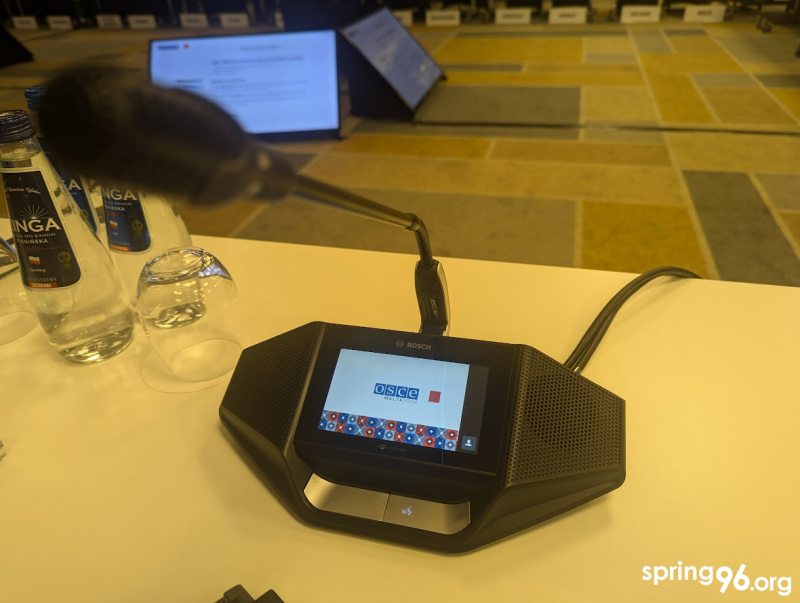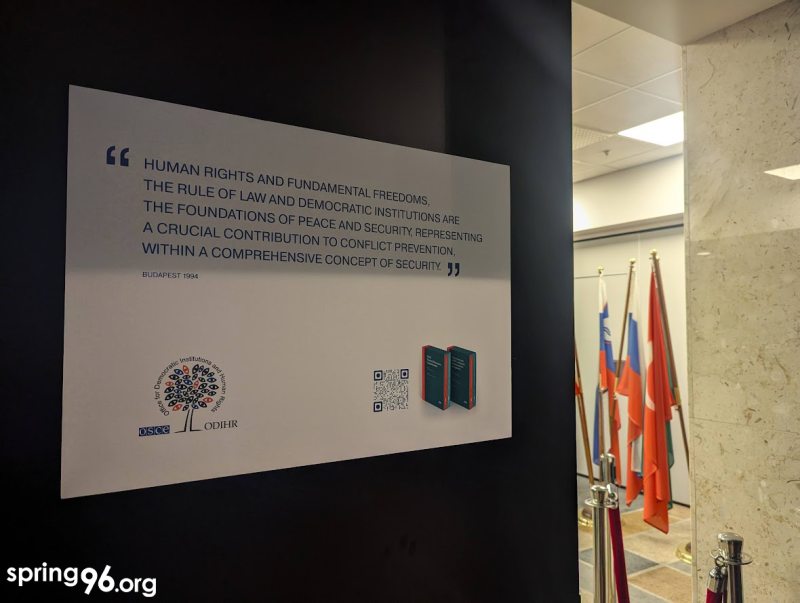"People are forced to leave the country." What did a Viasna human rights defender say at the OSCE conference
OSCE Human Dimension Conference is taking place in Warsaw (September 30 – October 11, 2024). Aleh Pashkevich, a Viasna human rights activist, also spoke there. He spoke about Human Rights Center Viasna documenting politically motivated persecution and its constant escalation.

According to the representative of Viasna, the number of people prosecuted in criminal cases in 2021 amounted to 1,225 people. In 2022, 1,240 peoplr. In 2023, 1,600 people. In the first 9 months of this year, the number of people prosecuted in criminal cases is approaching 1,000 people. As of today, there are about 6,000 cases of politically motivated convictions with various types of punishment. This figure has been calculated since the beginning of the election campaign, i. e. since May 2020. As of September this year, Viasna is aware of 429 cases of criminal and administrative prosecution and detention of people for political reasons.
"It is worth noting that even keeping under arrest means placing a person in very difficult, inhumane conditions. This is a purposeful policy of the state — exerting maximum pressure on these people," said the Viasna human rights defender. "In fact, this is how people are forced to leave the country, which, along with criminal prosecution, with politically motivated dismissals, leads to what can be equated with the forcible deportation of opponents of the current government from the country. At the moment, we know a figure, which is accepted at the UN level, of 300,000 people who were forced to leave the territory of the Republic of Belarus for political reasons."
Politically motivated dismissals are also documented, targeting individuals listed as detainees from 2020 and those labeled as "unreliable."
"And thus people are deprived of their means of livelihood, and people are afraid to talk about it. Essentially, it is virtually impossible to assess the scale of this persecution," the human rights defender added.

People who have experienced persecution are also deprived of the right to protection. The lawyers who defended them are deprived of the right to work in connection with defending the rights of their clients.
"This has already a common practice in our country, and at the moment we are witnessing a reluctance among lawyers to take on politically motivated cases due to fear. We respect those people who still have the courage to do it, but it's getting harder and harder. The truth is, the bar in Belarus as an independent institution has been destroyed."
One of the trends of the last year is the persecution of relatives of political prisoners for receiving assistance. In January 2020, Viasna was aware of at least 200 cases of such detentions. Many of them have reached the court. At the moment, the relatives of political prisoners who received assistance are being tried. The purpose of this pressure is to destroy the solidarity, the mechanisms that were developed in 2020 to help people cope with the persecution, the human rights defender noted.
"It can be stated that the repression aims at the destruction of any dissent within the country, the destruction of all institutions of civil society, including the press, public organizations, trade unions, human rights organizations, the third sector as such. Of course, civil society organizations continue to work in Belarus, but this activity cannot in any way aim at some kind of competition with state institutions, as this will be perceived as a threat and they will be dissolved."

In addition, the human rights defender mentioned that at least 215 people are currently at high risk for various reasons: health, age, family situation, lack of communication with the outside world, etc. At least 2,200 political prisoners have already been released, the vast majority having served their full sentences. Political prisoners face discrimination because they are marked with yellow tags in the penal colony.
"This is further accompanied by stricter requirements for correspondence, calls, visits, requirements for strict compliance with any, even the most absurd requirements, violation of which is punished more harshly than in the case of ordinary prisoners, including placement in a punitive isolation cell (SHIZO). Another problem is incommunicado," the human rights activist noted.
In addition, political prisoners suffer on an equal basis with other prisoners from poor nutrition, lack of medical care, non-compliance with labor protection standards, beatings by the administration or at the hands of other prisoners.
"As a result, political prisoners often require serious medical care and rehabilitation after their release. The vast majority have dental problems due to poor nutrition and lack of access to dental services. Their eyesight deteriorates and chronic diseases worsen. Many have post-traumatic disorders and other problems that require the help of psychologists and long-term recovery," concluded the Viasna human rights defender.

















